When Your First Language is Role-Playing Games
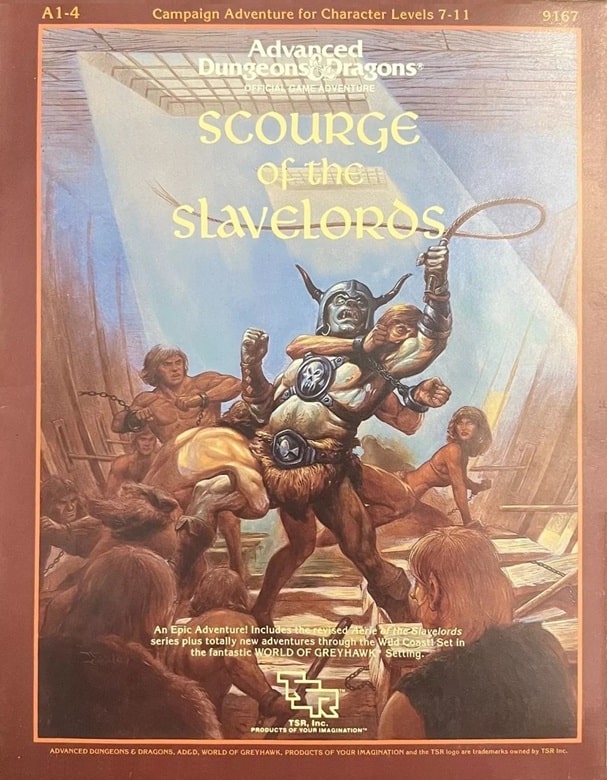 |
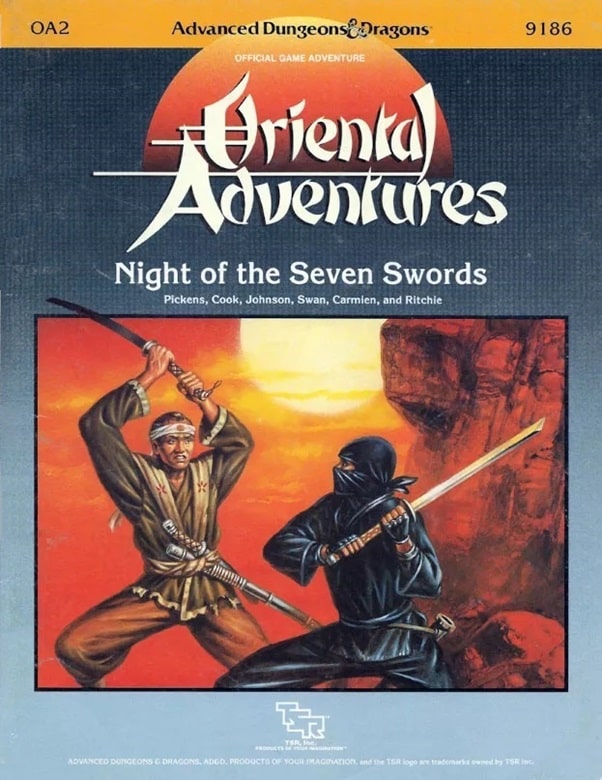 |
A1-4: Scourge of the Slavelords by David “Zeb” Cook, Allen Hammack, Harold Johnson,
Tom Moldvay, Lawrence Schick, and Edward Carmien (TSR, 1986), and Oriental Adventures:
Night of the Seven Swords by Jon Pickens, David “Zeb” Cook, Harold Johnson, Rick Swan,
Edward Carmien, and David James Ritchie (TSR, 1986). Cover art by Jeff Easley and Clyde Caldwell
Always a writer, the first significant things I wrote were role-playing adventures, some for old-school Dungeons & Dragons, but mostly for what the kids today call a home brew system based on the PrinceCon rules (kudos to the very very few who know that one). Later in life I’d write for TSR, Inc., including some AD&D stuff, work for the Indiana Jones game (hats off to the great Harold Johnson who had way too much fun making paper cut-outs exciting), writing for a family game called CrossCheck (I think? That assignment = a zillion or so crossword puzzle questions), basically whatever the company needed doing that no one else wanted to do.
But in these early, formative years, I came up with games and ran them for my friends, first in high school, then in college. By then I worked on poetry and fiction, too, and ran into a problem. I spoke RPGs. Fiction was essentially a second language.
[Click the images to role play with bigger versions.]
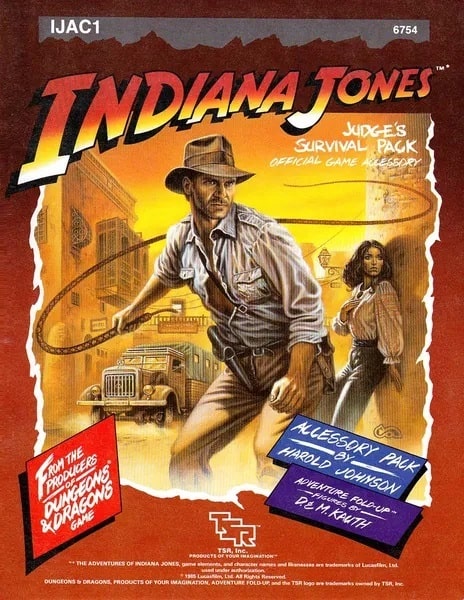 |
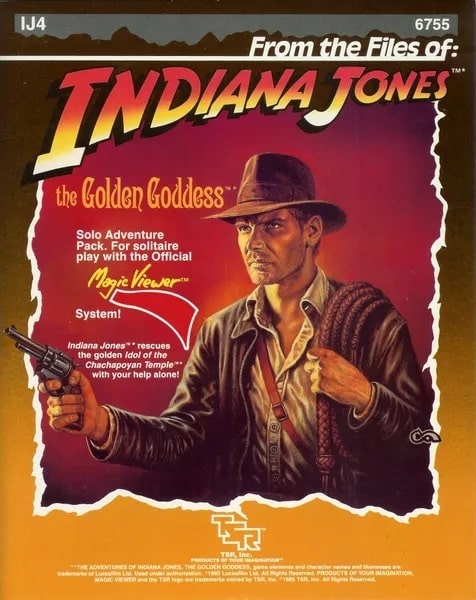 |
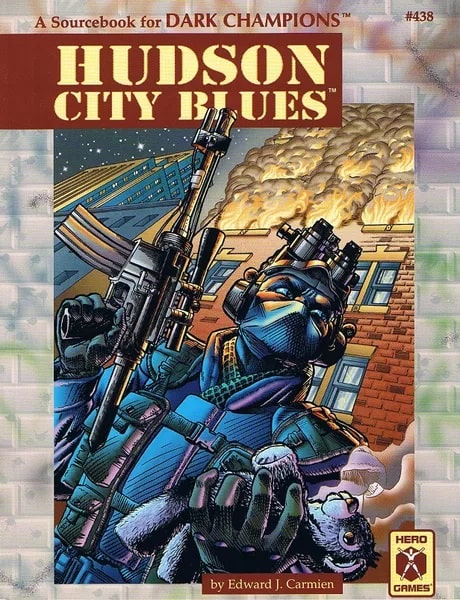 |
Indiana Jones AC1: Judge’s Survival Pack by Edward Carmien and Harold Johnson
(TSR, 1985), Indiana Jones 4: The Golden Goddess by Edward Carmien (TSR, 1985),
and Dark Champions: Hudson City Blues by Edward Carmien and Bruce Harlick
(Hero Games, 1994). Covers by Clyde Caldwell, Clyde Caldwell, and Fredd Gorham
Sure, I read voraciously. Always had. The usual late 1960’s, 1970’s suspects: Tolkien, Asimov, Le Guin, Silverberg (still kickin’, saw a picture of him signing stuff at WorldCon Glasgow), Cherryh (when the grad students come for my influences, tell ’em not to stop cutting until they get down past the Gibson and reach Cherryh bedrock), Clarke, Lynn Abbey (genius behind Thieve’s World), Roger Zelazny, Larry Niven – the list goes on.
We were past that golden era when one person could actually read everything in the Fantasy/SF world, but I tried. And that list is just the early stuff, much of which was “whatever DAW Books published” in distinctive yellow-spined paperbacks.
Gamma World by Gary “Jake” Jaquet and James M. Ward
(Tactical Studies Rules, 1978). Cover by David C. Sutherland, III
But one speaks a language not from reading it, but by speaking it. And the creative language I learned first? Role-Playing Games. My very first fan? A Floridian at GenCon in 1984 who found my rendition of a TSR game set in the aftermath of nuclear armageddon (Gamma World) too fabulous for words. I didn’t write the adventure, I just ran it – which included a whole lot of improvisation, AKA “making things up as I went along.”
It’s a great language to speak. But when it came time to work on fiction, it was like learning a new language–because it was. Even an adventure written like a railroad (limited player choice, the plot will unfold the way the plot unfolds) it isn’t the same as writing a story with the same parts. Credit writers like Margaret Weis and Tracy Hickman for bridging that divide with their groundbreaking Dragonlance trilogy, which in the world of writing is like pulling the lever on a slot machine and having it come up all sevens. Dragonlance started as a series of role-playing game scenarios, ended up also being novels – aw, just look it up.
Suffice to say, I learned to speak fiction, earning entry as a full member to the SFWA, and now a novel polished up and ready to go, looking for representation, plus two more in the rock-tumbler of revision, gettin’ shiny.
Edward Carmien’s last work for Black Gate was a five-part series on the Necronomicon convention in Providence, RI. His short stories “Before the Wind” and “Knives Under the Spring Moon” appeared in the print version on Black Gate in 2007 and 2008. He maintains a daily blog on writing at edwardcarmien.wordpress.com
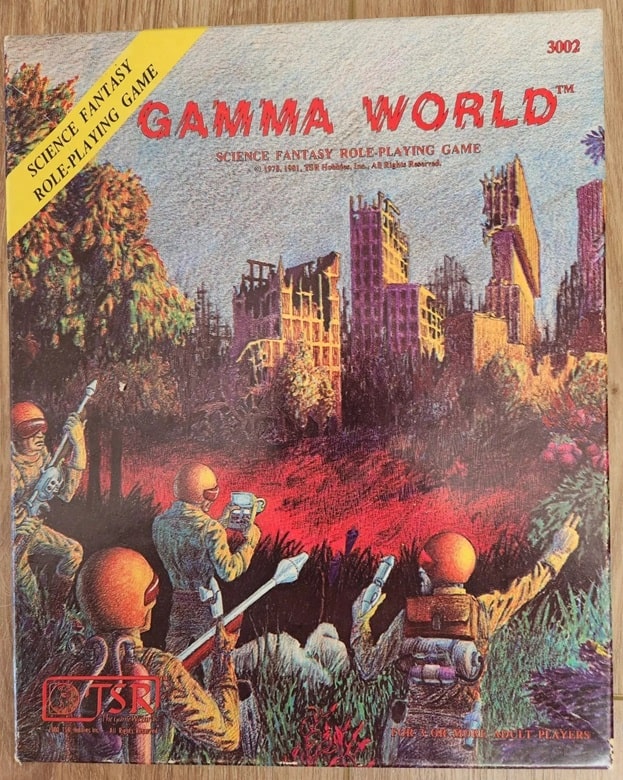
Wow, John O’Neill really did this right! The details added via art and illo subtitles are mostly correct….
Thanks for adding all the cover art!
Hi Ed… let me know what details I got wrong with the attributions, and I will correct ASAP! 🙂
I’ve attempted to write fiction, but not any time in the current century; I concluded a long time ago that the novel wasn’t my natural form. But I’ve been running RPG campaigns for decades, in a variety of systems, and I’ve accumulated a large pool of loyal players. I suppose a bit part of the difference is that as a game master you have several co-authors who get to make up significant parts of the story.
I worked on homebrews back in the 1980s, but in the early 1990s I decided to give up and run everything in published systems, with my energy going into creating worlds, NPCs, and situations. I’ve never regretted that decision.
I have found RPG to be a less-common language than I hoped it would be. Whenever I teach a lecture on probability, I always toss in the terms “1d6”, “1d4”, “2d6”, and the like. But rarely do I get any recognition from the students. And yet, some of them must know the basics (i.e., D&D). Puzzling!
I play GURPS, so all I use is 1D, 2D etc
Ah, GURPS, played many a genre using that system.